Directed and produced by John J. Michalczyk, and Susan A. Michalczyk, in collaboration with their son, John J. Michalczyk III, these documentaries focus on issues of social justice, both historical and current, as well as conflict resolution in world trouble spots, including Northern Ireland, Germany, the Balkans, Africa, the Middle East, Sicily, Russia, and the United States
Film Production
- 2024 Lou Montgomery: His Story is Our Story
- 2022 The U-Boat and the Rocket: The Fate of Two German Brothers in Postwar America
- 2021 Hitler’s Mein Kampf: Prelude to the Holocaust
- 2010 Edwina Sandys: Breaking through, Breaking Free, and Reviving Humanity (25 min.)
- 2009 Keith Jones: Un-Rapping Disability (14 min.)
- 2016 Nazi Law: Legally Blind
- 2016 Lou Montgomery: A Legacy Restored
- 2014 A Matter of Conscience: Confronting Clergy Abuse
- 2013 Who Takes Away the Sins: Witnesses to Clergy Abuse
- 2011 Kenya: Passing the Baton
- 2009 Writing on the Wall: Remembering the Berlin Wall
- 2009 Confronting Amnesia: Frozen Memories of the Russian Gulag
- 2007 Creating Harmony: The Displaced Persons Orchestra from St. Ottilien
- 2005 Rick’s Eyes on the Prize: Running with Team Hoyt
- 2004 Killing Silence: Taking on the Mafia in Sicily
- 2003 Different Drummers: Daring to Make Peace in the MidEast
- 2002 Celtic Waves: The Flow of Irish Emigration
- 2001 South Africa: Beyond a Miracle
- 2000 Unexpected Openings: NorthernIreland Prisoners
- 1999 Prelude to Kosovo: War and Peacein Bosnia and Croatia (PBS)
- 1998 Out of the Ashes: Northern Ireland’s Fragile Peace (PBS)
- 1997 December’s Dilemma: The Creche,the Dreidel, and the Star (PBS)
- 1995 Of Stars & Shamrocks: Boston’s Jews & Irish (PBS)
- 1992 The Cross and the Star: Jews, Christians, and the Holocaust
- 1988 Fidelity Not Mutual (25 min.) (Screened at Athens, Ohio Film Festival)
- 1986 Fred Wiseman: Filming the American Institution (28. min.)
Lou Montgomery: His Story is Our Story
 Lou Montgomery: His Story is Our Story, a sequel to Lou Montgomery: A Legacy Restored, revolves around the ways in which society has chosen to address, or look past, the inequalities of racism and injustice, from the time Lou Montgomery was a young athlete growing up in Brockton, MA, through his college years. As a member of the 1940 “Team of Destiny” at Boston College, Lou Montgomery, the first Black athlete at BC, understood the significance of his role at a time when Jim Crow laws violated justice and perpetuated a racist America. Courageously teaching by example, he helped forge a path for other young Black athletes faced with being “the only,” or “the first.”
Lou Montgomery: His Story is Our Story, a sequel to Lou Montgomery: A Legacy Restored, revolves around the ways in which society has chosen to address, or look past, the inequalities of racism and injustice, from the time Lou Montgomery was a young athlete growing up in Brockton, MA, through his college years. As a member of the 1940 “Team of Destiny” at Boston College, Lou Montgomery, the first Black athlete at BC, understood the significance of his role at a time when Jim Crow laws violated justice and perpetuated a racist America. Courageously teaching by example, he helped forge a path for other young Black athletes faced with being “the only,” or “the first.”
This documentary bridges Lou Montgomery’s story, beginning in the early 1930’s in Massachusetts, with contemporary experiences of high school and college student-athletes, through interviews with current and former members of Brockton High School and Boston College football teams. Through his own words and achievements, and the reflections of former members of the NFL, historians, educators/administrators, coaches, and religious leaders, Lou Montgomery, an outstanding athlete, scholar, and gentleman, continues to inspire the next generation to tackle racism, and to work together for social justice.
Hitler’s Mein Kampf: Prelude to the Holocaust
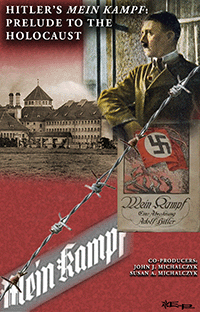 A short distance from where Hitler wrote his manifesto, Clarice Henry, a journalist for the Landsberger Tagblatt [Landsberg Daily newspaper], wrote at the World Premiere of the documentary:. “The film tries to fathom on a rational level to what extent Hitler's early work can be linked to the later crimes….[Herein are] questions that can contribute far more to the future of humanity, so that ‘something like this does not happen again,’ as politicians like to proclaim on various occasions. These questions could focus more on how something like this could have happened from the perspective of society as a whole. Here, elements from psychology, sociology and neuropsychology would be of considerable interest. It may take time, but the work of Susan and John Michalczyk may have laid a significant foundation for a new way of dealing with the subject of National Socialism - and with it, a possibility that such a thing will indeed never happen again. One comes [to the film] with a bias that cannot be dismissed and leaves with hope.”
A short distance from where Hitler wrote his manifesto, Clarice Henry, a journalist for the Landsberger Tagblatt [Landsberg Daily newspaper], wrote at the World Premiere of the documentary:. “The film tries to fathom on a rational level to what extent Hitler's early work can be linked to the later crimes….[Herein are] questions that can contribute far more to the future of humanity, so that ‘something like this does not happen again,’ as politicians like to proclaim on various occasions. These questions could focus more on how something like this could have happened from the perspective of society as a whole. Here, elements from psychology, sociology and neuropsychology would be of considerable interest. It may take time, but the work of Susan and John Michalczyk may have laid a significant foundation for a new way of dealing with the subject of National Socialism - and with it, a possibility that such a thing will indeed never happen again. One comes [to the film] with a bias that cannot be dismissed and leaves with hope.”
Nazi Law: Legally Blind
(Premiere: May 7, 2016, Museum of Fine Arts, Boston)
Narrated by Michael Resler, Ph.D.
Filmed in Nuremberg, Munich and the Dachau concentration camp, Nazi Law: Legally Blind exposes the Nationalist Socialist government’s aggressive and manipulative plan that dismantled constitutional law, usurpedJustice and created a lethal totalitarian system that eventually engulfedGermany and all of Europe.
“The Nazi leadership used a series of legal mechanisms—which, in contrast to the revolutionary overthrow of power in 1918, judges tended to consider legitimate—to gradually assume and consolidate Hitler’s power. Then, step by step, and always under the guise of safeguarding the state, the Nazi leadership imposed legislation that fulfilled its ideological goals of rearmament, military expansion, and racial purification. Throughout the 1930s and especially after the Nazi regime began World War II in 1939, the judiciary typically rendered verdicts according to the principles of Nazi ideology and the wishes of the Führer.”
(US Holocaust Memorial Museum, 2009)
The documentary was featured at the International Film Festival, Grand Caymans, in March 2016 and will be internationally distributed by American Public Television.
Lou Montgomery: A Legacy Restored
(Premiere: February 20, 2016, Museum of Fine Arts, Boston)
Narrated by Donald A. Garnett
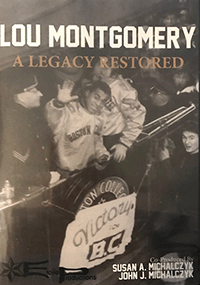 Lou Montgomery: A Legacy Restored explores the racial climate of the times when in 1937, Lou Montgomery became the first black football player at Boston College. A major contributor to the building of BC’s “Team of Destiny,” Mr. Montgomery was left on the sidelines due to the racial prejudice of the Jim Crow era, and over time, Lou Montgomery and his contributions were forgotten, as were his sacrifices. The film was screened at Boston College in April 2016 and was part of the Reconnect II, AHANA Alumni Weekend at Boston College in July 2016. The film was also selected for screening at the Roxbury International Film Festival in 2017.
Lou Montgomery: A Legacy Restored explores the racial climate of the times when in 1937, Lou Montgomery became the first black football player at Boston College. A major contributor to the building of BC’s “Team of Destiny,” Mr. Montgomery was left on the sidelines due to the racial prejudice of the Jim Crow era, and over time, Lou Montgomery and his contributions were forgotten, as were his sacrifices. The film was screened at Boston College in April 2016 and was part of the Reconnect II, AHANA Alumni Weekend at Boston College in July 2016. The film was also selected for screening at the Roxbury International Film Festival in 2017.
Available to Rent/Buy online now!
This compact documentary touches all the bases, presenting an
informative and poignant picture of the intersection of segregation,
enlightenment, and failure in America’s institutions of higher
education. It is a thought-provoking look at a forgotten moment
of shame at an otherwise crusading school. And it brings back
into focus an admirable player in the war against racial injustice,
an athlete who should not be forgotten.
Paul Dervis, The Arts Fuse
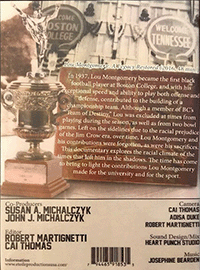 http://artsfuse.org/141058/fuse-film-review-lou-montgomery-legacy-restored-mission-accomplished/
http://artsfuse.org/141058/fuse-film-review-lou-montgomery-legacy-restored-mission-accomplished/
http://bcheights.com/top-story/2016/the-lasting-legacy-of-lou-montgomery/
http://bcgavel.com/2016/03/03/documentary-revisits-history-of-racism-in-bc-football/
The film was screened at Boston College in April 2016 and was part of the Reconnect II, AHANA Alumni Weekend at Boston College in July 2016.
A Matter of Conscience: Confronting Clergy Abuse
(Premiere: October 4, 2014, Museum of Fine Arts, Boston)
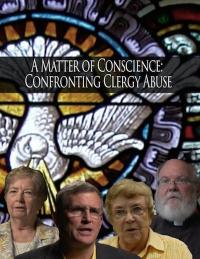 Narrated by Robbie McCauley
Narrated by Robbie McCauley
The 50 minute documentary, A Matter of Conscience: Confronting Clergy Abuse focuses on the courageous individuals who placed the welfare of vulnerable and innocent children above the image of the Catholic Church. Those who came forward to report clergy abuse to religious and civil authorities suffered serious repercussions, including being marginalized by other religious. Yet, they made the decision to act rather than look away, and to speak up rather than remain silent. Their words and their actions demonstrate the strength of individuals who take a stand when facing the abuse of power. With a new Pope pledging transparency, is it possible to see future significant changes that bring about accountability and justice? This documentary evolved from the earlier film, Who Takes Away the Sins: Witnesses to Clergy Abuse (2013), and begins with the narratives of survivors.
The film has power, believability and strength because
the people depicted who chose to stay in religious life
and those who left continue to speak and advocate, ‘not
out of malice or revenge but really for issues of integrity.
That speaks volumes against all the hypocrisy we’ve seen
in the traditional religious response,’ Susan Michalczyk said.
Beth Griffin National Catholic Reporter
Read the Hamilton and Griffin on Rights blog post about this film here.
The film was also screened at Yeshiva University, Cardozo Law School in February 2015, the Voice of the Faithful national conference, Hartford, Conn., April 2015, and Boston College, December 2015, and broadcast in Oregon, Washington and California on Oregon Public Broadcasting in late 2016.
Information: Prof. John Michalczyk (michalcj@bc.edu) Prof. Susan Michalczyk (michalcz@bc.edu)
Who Takes Away the Sins: Witnesses to Clergy Abuse
(Premiere: May 1, 2013, Museum of Fine Arts, Boston)
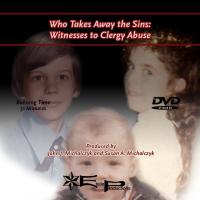 In 2002, The Boston Globe Spotlight Team exposed the long-hidden dark secrets of the Catholic Church cover-up of the sexual and psychological abuse of young girls and boys by clergy. Who Takes Away the Sins: Witnesses to Clergy Abuse presents the personal narratives of individual survivors and advocates who, together, confront these unconscionable acts, and in so doing, counter the betrayal and failed accountability of the Church hierarchy.
In 2002, The Boston Globe Spotlight Team exposed the long-hidden dark secrets of the Catholic Church cover-up of the sexual and psychological abuse of young girls and boys by clergy. Who Takes Away the Sins: Witnesses to Clergy Abuse presents the personal narratives of individual survivors and advocates who, together, confront these unconscionable acts, and in so doing, counter the betrayal and failed accountability of the Church hierarchy.
“What distinguishes the Church in this sexual abuse scandal is not so much that some percentage of priests did this, but that the institution betrayed the people who looked to it for all sorts of spiritual and moral leadership.”
Walter V. Robinson, The Boston Globe investigative reporter
“The mentality of somebody who could abuse a child is unfathomable to those who really know the worth of a child…It just takes years to unwrap all of the guilt, the shame and the confusion that these people put into you when they do something like that.”
Robert Hoatson, Ph.D., Executive Director, Road to Recovery
The film was screened at Boston College in May 2013, followed by a repeat screening at the Museum of Fine Arts Boston in October 2013. The documentary will also be broadcast in Oregon, Washington and California on Oregon Public Broadcasting in late 2016.
Kenya: Passing the Baton
(Premiere: September 21, 2011, Museum of Fine Arts, Boston)
Narrated by Liz Walker
Kenya: Passing the Baton sheds light on the struggle of a people and their government to create a united, civil society, following the controversial elections of 2007, with a focus on the support offered by Rotary International and the Jesuit Hakimani Center in Nairobi.
Writing on the Wall: Remembering the Berlin Wall
(Premiere: October 11, 2009, Museum of Fine Arts, Boston)
 Narrated by Michael Resler, Ph.D.
Narrated by Michael Resler, Ph.D.
Writing on the Wall: Remembering the Berlin Wall, produced to coincide with the 20th anniversary of the fall of the wall (Nov. 9th, 1989), recounts the stories of leaders and ordinary citizens caught in the political power struggle symbolized by the Berlin Wall,” including: Edwina Sandys, Winston Churchill’s granddaughter; Sergei Khrushchev, Nikita Khrushchev's son; Baron Hermann von Richthofen, a former German Ambassador to Great Britain; Wolfgang Thierse, Vice-President of the German Parliament, and Alexandra Hildebrandt, Director of the Museum at Checkpoint Charlie.
Since its release, the film has been shown nationally and internationally in New York, Washington, DC, Fulton, Missouri, Boston, Berlin, Montreal and Milan.
Confronting Amnesia: Frozen Memories of the Russian Gulag
(Premiere: January 2009, Museum of Fine Arts, Boston)
Narrated by Michael Chapman
The Russian Gulag, considered one of the worst violations of human rights in history, is the subject of Confronting Amnesia: Frozen Memories of the Russian Gulag, a study of the Soviet Union's network of forced labor camps used to imprison millions of citizens. Filmed on location in Siberia, Moscow, Perm and St. Petersburg, the testimony and images document the enormity of the evil perpetrated in the Gulag, yet another reminder of the human capacity to inflict organized suffering on vulnerable populations.
The documentary was screened at Boston College in February, 2009 and was featured in April 2013, at a conference on Gulag scholarship at Georgetown University.
Creating Harmony: The Displaced Persons Orchestra from St. Ottilien
(Premiere: November 2007, Museum of Jewish Heritage-A Living Memorial to the Holocaust with follow-up screening at the Museum of Fine Arts, Boston in December, 2007)
Narrated by Tovah Feldshuh
Creating Harmony, a sequel to the documentary Displaced! Miracle at St. Ottilien, about two Army privates' campaign to stop abuse of displaced persons in the camp, follows the Jewish orchestra from their origins in St. Ottilien Displaced Persons Camp. The story memorializes the courageous musicians who survived the Nazis during World War II and the message of hope and inspiration their newly formed orchestra brought to fellow survivors and the world. The orchestra performed for survivors at St. Ottilien, and then across Germany for audiences that included Golda Meir and the Nuremberg Trial judges. Famed conductor Leonard Bernstein led the orchestra in two concerts.
For Sonia Beker, author of Symphony on Fire: A Story of Music and Spiritual Resistance During the Holocaust and daughter of musicians who survived the camps, the orchestra serves as a reminder that “after all that's happened. We can still create something beautiful that we can share with one another and with the world, even though the world did not care.’”
The film was screened, accompanied by the Hawthorne Quartet at the Coolidge Corner Cinema in 2008.
Rick’s Eyes on the Prize: Runningwith Team Hoyt
I,Claudia: In the Deaf Community of Nicaragua
Andrea: A True Gem
(Premiere: November 2005, Boston College, Chestnut Hill)
These films, in collaboration with persons living with disabilities, visible and invisible, documents their personal experiences as they face the challenges of daily life.
Rick's Eyes on the Prize: Running with Team Hoyt, depicts the amazing accomplishments of father-son athletes and Boston Marathon competitors Dick and Rick Hoyt. Team Hoyt has participated in more than 900 athletic competitions, including more than 20 Boston Marathons and the grueling Ironman Triathlon in Hawaii, consistently challenging people's perceptions of disabilities.
In the film, Rick communicates the appeal of racing: “People sometimes treat me as if I'm not there, but when I'm racing I don't feel any of that” and his message in the film is “If people who watch us compete could just begin to understand that the disabled are normal, that we have rich, productive lives--that's all I ask. That's my prize.”
They are models of father-and-son devotion. They are inspirations.
While their public accomplishments have transformed the Hoyts
into high-visibility competitors, Michalczyk's film restores their
individuality as unlikely candidates for fame. The film's singular
strength comes from Rick Hoyt's 'speaking role' through computer
technology that lets him record his feelings about racing with his
father, his disability and the public's perception of him.
Chris Bergeron, MetroWest Daily News
I,Claudia: In the Deaf Community of Nicaragua documents the life of a charismatic young woman who is hearing-impaired. Filmed on location in Bluefield, Nicaragua, the documentary follows Claudia’s journey from student to activist and leader for those living with disabilities.
Andrea: A True Gem tells the story of a 27-year-old woman, with Williams Syndrome, a rare genetic condition that causes medical and developmental problems. Andrea’s story takes place at the Camphill Community in New York State.
Killing Silence: Taking on the Mafia in Sicily
(Premiere: November 2004, Museum of Fine Arts, Boston)
Narrated by Will Lyman
Killing Silence: Taking on the Mafia in Sicily looks at the historic rise of the Mafia from the waning days of World War II to the Mafia wars of the 1970s and '80s, all the while with a focus on the anti-Mafia movement. Through personal narratives of courageous Sicilians to break the code of silence, which include the former mayor of Palermo, Leoluca Orlando; Sicilian-born Cardinal Salvatore Papalardo, retired bishop of Palermo; lawyers, authors, psychologists and businessmen, the film chronicles the hope about a new generation willing to discuss and challenge the old ways of life in Mafia-controlled Sicily. Filmed on location.
John Michalczyk has “channeled his social activism into filmmaking.”
Donna Goodison, The Boston GlobeJohn Michalczyk's new documentary, 'Killing Silence' explores
the devastation and valor left in the wake of a social revolution, a battle
of good versus evil…[He] is a seasoned documentarian, having directed
and produced more than a dozen films, each of which explores conflict
prompted by social discord.
Sara Faith Alterman, NewEnglandFilm.comKilling Silence is a revealing travelogue into Sicilian society. Mixing
history and sociology, Michalczyk examines how the Mafia became
entrenched in Sicilian life and how its violent excesses drove the public
to finally take a stand against it.
Chris Bergeron, The MetroWest Daily News
Different Drummers: Daring to Make Peace in the MidEast
(Premiere: November 2003, Museum of Fine Arts, Boston)
Narrated by Will Lyman
Different Drummers: Daring to Make Peace in the Mideast is a portrait of several Israeli peacemakers who provoke others to join their voices for peace and justice. Well-known Palestinians briefly reply to their concerns. The American media have portrayed Israel as a country scarred by the violence of suicide bombers, demolitions and collective punishments, and the human rights issues unfortunately, appear to fade into the background. Despite the atmosphere of 'terror' that hovers over both Palestinian and Israeli, there are Israeli voices heard over the din that cry out for a just and lasting peace.
Michalczyk succeeds in deflating conventional stereotypes
about Israelis and Muslims. [The] film is informative,
even-handed and never didactic. [This] documentarian
is just trying to make a better world.
Chris Bergeron, MetroWest Daily News
The film was also screened at the 2004 Vancouver International Film Festival and the Scituate, MA Film Festival in 2006.
Celtic Waves: The Flow of Irish Emigration
(Premiere: December 2002, Museum of Fine Arts, Boston)
Narrated by Brian O’Donovan
Celtic Waves: The Flow of Irish Emigration explores the effects of 150 years of emigration trends on the culture of Ireland. Filmed on location in the Republic of Ireland and Northern Ireland over the course of three years, the documentary examines the socio-political, economic and psychological transformation of a culture with a focus on four time periods: the 1840s Famine, the turn of the 20th century, the hostile 1950s, and the 1980s and 1990s with the emergence of the ‘Celtic Tiger.’
The film was also screened as part of the Boston College Irish Film Series in April, 2003 and the Boston Irish Film Festival in October, 2004.
Michael’s Eagle Eyes
(Premiere: December 2002, Boston College, Chestnut Hill)
An inspiring narrative of overcoming the misperceptions and stigma surrounding disability, Michael Nash’s story recounts a family’s courage and persistence, a collaboration of human commitment and innovative technology that allows Michael to regain his life and graduate from Marshfield High School.
Michalczyk made a film about a ‘day in Michael's life’
that portrayed his emergence as a triumph of his willpower
and family's loving support. [Nash's mother] credited
Michalczyk for 'embracing' her son by making a film
that will remind society never to give up on its seemingly
disabled members.
Chris Bergeron, MetroWest Daily News
Displaced: Miracle at St. Ottilien
(Premiere: November 2002, Katz Jewish Community Center, Cherry Hill, NJ)
Narrated by Studs Terkel
Displaced: Miracle at St. Ottilien documents first-hand experiences of US Army privates Edward Herman and Robert Hilliard, stationed in Germany at the close of World War II, who after discovering the horrendous treatment of displaced Jews in St. Ottilien, a camp run by the US military attempt to alleviate the suffering and correct the injustices at the camp. The film is based on a memoir written by Mr. Hilliard.
Michalczyk is an accomplished and highly-regarded filmmaker,
who has focused on social justice…Herman, Hilliard and
Michalczyk all believe that the message to be gained from
the new film is that ordinary people exerting extraordinary
efforts can make a difference. For his part, Michalczyk said
he hopes that the film will inspire viewers to emulate Herman
and Hilliard, who 'looked at human beings who were suffering,
waded through all the paperwork, all the rules and regulations
and changed the world.'
Susan L. Sherwood, Wayland Town Crier
A New England premiere was held at Boston College in February, 2003. Additional screenings include: the Toronto Jewish Film Festival (May, 2003), the Rhode Island International Film Festival (August, 2003), the Boston Jewish Film Festival (November, 2003) and the 2004 World Jewish Film Festival in Tel Aviv. In the fall of 2004, "Displaced" also was showed at the Museum of Jewish Heritage in NY and was broadcast on public television, WBGH2, in October 2004.
South Africa: Beyond a Miracle
(Premiere: April 2001, Museum of Fine Arts, Boston)
Narrated by Tug Yourgrau
This documentary chronicles the evolution of South Africa from the tragic years of apartheid to exhilarating elections, and finally to the cautious hopes of building a strong democracy. Shot on location in Johannesburg, Soweto, Pretoria, Capetown, Port Elizabeth, and Durban, the documentary features interviews from witnesses—representing various geographical areas and profession—to the rebirth of South Africa. The interviews were conducted by Boston journalist Clark Booth.
The film has also been broadcast on PBS television WGBH-Boston in October, 2001; in Paris, France for UNESCO (United Nations Educational, Scientific and Cultural Organization) in March, 2003 and at the Scituate MA Film Festival in March, 2006.
How nice that South Africa has shaken off its legacy of
apartheid and become one less place to worry about.
That's not quite the case, as local filmmaker John Michalczyk
points out in South Africa: Beyond a Miracle.
Peter Keough, The Boston Phoenix
Unexpected Openings: Northern Ireland Prisoners
(Premiere: September 2000, Museum of Fine Arts, Boston)
Unexpected Openings: Northern Ireland's Prisoners, a documentary that chronicles the evolution of the paramilitaries in Northern Ireland from the times of "The Troubles" through the tenuous peace process, features interviews with government officials, politicians, police, prison chaplains and victims of the violence. Many of the former prisoners are now working in social work, politics and education, and have become Northern Ireland's hidden resource in the peace process.
Shot on location, including in the Maze and Crumlin Road prisons, the film received a New England Emmy Award nomination and was broadcast in October, 2000 on PBS television WGBH-Boston and later in June 2004, screened as part of the Common Ground Film Festival held in Jerusalem.
The 1998 peace agreement that led to the early release
of many of Ulster's political prisoners was not due to a
sudden groundswell of goodwill. Rather, says John
Michalczyk's engrossing documentary, it stemmed from
seeds planted as far back as 1966.
Mike Milliard, Boston Phoenix
Prelude to Kosovo: War and Peacein Bosnia and Croatia
(Premiere: September 1999, Museum of Fine Arts, Boston)
Narrated byWren Ross
Prelude to Kosovo: War and Peace in Bosnia and Croatia, a film depicting the bitter civil war in the former Yugoslavia, and shot on location in Serbia, Croatia and Bosnia, combines graphic footage and interviews with religious and political figures. The film addresses the ideology of "ethnic cleansing" and the massacres resulting from a nationalist quest for political, cultural and religious domination. The Serbian Orthodox, Bosnian Muslim and Croatian Catholic perspectives are all represented.
The film challenges some of the conventional wisdom
about the recent horrors there and offers some plausible
shreds of hope for reconciliation and a brighter future.
Michalczyk also has a background in theology, and it is
his clear ecumenical spirit and interest in religious history
that animates this informative and worthy film.
John Koch, Boston Globe
Boston PBS affiliates WGBH and WGBX broadcast the film in November, 1999 and the film was later screened at the Scituate MA Film Festival in March, 2006.
Out of the Ashes: Northern Ireland’s Fragile Peace (PBS)
(Premiere: March 1998, Museum of Fine Arts, Boston)
Narrated by Will Lyman
Out of the Ashes: Northern Ireland's Fragile Peace chronicles “The Troubles” in Northern Ireland, offering personal and historical views of the unrest in Northern Ireland through the mid-1960s up to the start of the Peace Accords. Interviews with political and religious leaders, former paramilitaries, and Catholic and Protestant children, including then Sinn Fein President Gerry Adams address the challenges of the peace process, by people who are truly fostering a long-term change.
Filmed on location in Derry, Belfast and Dublin, the documentary also features the work of renowned musicians Phil Coulter, Robbie O'Connell, and Seamus Connolly. The film was broadcast on PBS television WGBH-Boston in July, 1998 and on PBS television KCET Los Angeles in August, 1998.
December’s Dilemma: The Creche, the Dreidel, and the Star
(Premiere: December 1997, Boston College, Chestnut Hill)
December's Dilemma: The Creche, the Dreidel and the Star examines contemporary interfaith issues associated with the holidays and offers a fresh view of the origins and spirit of the two rich traditions of Christmas and Chanukah, while at the same time revealing the tensions of interfaith marriage, controversies over public displays of religious symbols and isolation during this season of light. The documentary features interviews with leading Jewish and Catholic theologians, clergy, sociologists, authors and teachers.
The film premiered on PBS television WGBH-TV Boston in December, 1997 and was rebroadcast in December, 1998.
In the Shadow of the Reich: Nazi Medicine
(Premiere: April 1997, Museum of Fine Arts)
Narrated by Donald Winning
The release of In the Shadow of the Reich: Nazi Medicine coincided with the 50th Anniversary of the Nuremberg Physicians' Trial (December 1946-August 1947). Filmed at the Auschwitz and Majdanek concentration camps, the documentary focuses on interviews with the leading physicians, scholars and survivors involved in the study of Nazi medicine, including a 1995 interview at Auschwitz with a former S.S. doctor, Hans Munch and Mengele twin survivor, Eva Kor. This documentary graphically traces the medical profession's involvement in Nazi Germany and raises questions about medical ethics in contemporary society.
In the Shadow of the Reich premiered on PBS television WGBH-TV Boston in April, 1997 and WNET-TV New York in May, 1997. Nominated for a New England Emmy Award, the film was screened at TASH, an international disability advocacy association. John Michalczyk was presented with the TASH 1997 Media Award in film, honoring this documentary.
Michalczyk…brings a sense of moral outrage and a talent
for historical precision to the horror of medical
experimentation during the Third Reich…Nazi Medicine
should be required, if painful, viewing.
Michael Blowen, The Boston Globe
Of Stars & Shamrocks: Boston’s Jews & Irish
(Premiere: October 1995, Museum of Fine Arts and PBS)
Narrated by Brian O’Donovan
Of Stars and Shamrocks: Boston's Jews and Irish examines the historical, religious, social and political aspects of the Irish-Jewish relationship in Boston, paralleling the arrival of both ethnic groups, from oppression, from pogroms and famine, to settle in Protestant Brahmin Boston of the late 19th and early 20th centuries. The film documents the bitter rivalries of the 1920s and ’30s and the changing views following World War II and the Second Vatican Council.
“Local history buffs should tune into 'Of Stars and Shamrocks: Boston's Jews and Irish,' an oft-told, but authoritative, elegantly documented story of Jews and Irish in Boston.”
Frederic M. Biddle, The Boston Globe
The documentary premiered on PBS television WGBH-TV and WGBX-TV Boston in October 1995 and was nominated for a New England Emmy Award in 1996. A year later, the film was broadcast on Boston Catholic Television and shown on RTE in Dublin.
The Cross and the Star: Jews, Christians, and the Holocaust
(Premiere: December 1991, Coolidge Corner Cinema, Brookline and Boston Catholic Television)
The Cross and the Star: Jews, Christians and the Holocaust examines Christian anti-Semitism through the ages and its effects upon the Holocaust. The provocative documentary reveals the disheartening echoes of anti-Semitism in Christian dogma many centuries prior to the rise of the Third Reich; from the gospels and early Church writings, through the Crusades and the Spanish Inquisition. Along with interviews of many Holocaust survivors, scholars, and clergy of Protestant, Catholic, and Jewish backgrounds, the film presents extensive archival footage of Nazi Germany.
“I was very taken with The Cross and the Star. Not only is it moving and graphic history, it is the most honest and penetrating analysis of Christianity's role in the Holocaust, for good and for ill, that I know of.”
Rabbi Harold Kushner, author of When Bad Things Happen to Good People
The documentary made its debut at the Coolidge Corner Cinema in Brookline, Mass. in December, 1991. It was aired on Boston Catholic Television in the fall of 1997. The documentary is distributed widely by First Run Features (New York) and used extensively in Holocaust education courses and conferences.
